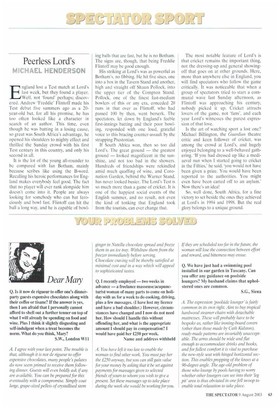Peerless Lord's mic4
England lost a Test match at Lord's last week, but they found a player. Well, not 'found' perhaps; discovered. Andrew 'Freddie' Flintoff made his Test debut five summers ago as a 20year-old but, for all his promise, he has too often looked like a character in search of an author. This time, even though he was batting in a losing cause, so great was South Africa's advantage, he opened his shoulders to mighty effect and thrilled the Sunday crowd with his first Test century in this country, and only his second in all.
It is the lot of the young all-rounder to be compared with Ian Botham, mainly because scribes like using the B-word. Recalling his heroic performances for England makes everybody feel good. The fact that no player will ever rank alongside him doesn't come into it. People are always looking for somebody who can bat ferociously and bowl fast. Flintoff can hit the ball a long way, and he is capable of bowl
ing balls that are fast, but he is no Botham. The signs are, though, that being Freddie Flintoff may be good enough.
His striking at Lord's was as powerful as Botham's. no fibbing. He hit five sixes, one into a box in the Tavern Stand and another, high and straight off Shaun Pollock, into the upper tier of the Compton Stand. Pollock, one of the finest fast-medium bowlers of this or any era, conceded 20 runs in that over as Flintoff, who had passed 100 by then, went berserk, The spectators, let down by England's feeble first-innings batting and their poor bowling, responded with one loud, grateful voice to this bracing counter-assault by the strapping Prestonian.
If South Africa won, then so too did Lord's. The great ground — the greatest ground — looked magnificent in the sunshine, and not too bad in the showers. Hundreds of friendships were rekindled amid much quaffing of wine, and Coronation Garden, behind the Warner Stand, has never looked busier, The Lord's Test is so much more than a game of cricket. It is one of the happiest social events of the English summer, and no result, not even the kind of tonking that England took from the tourists, can ever change that. The most notable feature of Lord's is that cricket remains the important thing, not the dressing-up and general showingoff that goes on at other grounds. Here, more than anywhere else in England, you will find spectators who follow the game critically. It was noticeable that when a group of spectators tried to start a communal wave last Sunday afternoon, as Flintoff was approaching his century, nobody picked it up. Cricket attracts lovers of the game, not 'fans', and each year Lord's witnesses the purest expression of that love.
Is the art of watching sport a lost one? Michael Billington, the Guardian theatre critic and keen follower of cricket, was among the crowd at Lord's, and hugely enjoyed belonging to a well-behaved gathering. 'If you had dressed up like a mediaeval nun when I started going to cricket in the Fifties,' he said, 'you would not have been given a prize. You would have been reported to the authorities. You might even have been carted off to an asylum.' Now there's an idea!
So, well done, South Africa, for a fine victory to set beside the ones they achieved at Lord's in 1994 and 1998. But the real glory' belongs to a unique ground.


































































 Previous page
Previous page